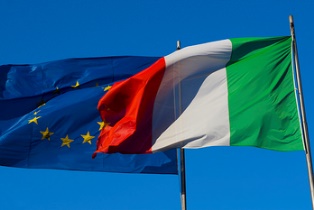
 Francesca Papasergi
Francesca Papasergi
Italian politics: The European Union, cost or opportunity?
- WTI Magazine #21 Mar 14, 2014
-

 Francesca Papasergi
Francesca Papasergi
WTI Magazine #21 2014 Mar, 14
Author : Francesca Papasergi Translation by:
In the post-World War II scenario, while many countries destroyed by bombs tried to recover, a bunch of day-dreamers had a dream called Europe. Fifty-seven years after the Treaty of Rome signing ceremony, Europeans are experiencing the realization of that dream, and it turned out to be nightmarish for many of them.
Many citizens - mostly from the less wealthy countries - are discouraged because of the strict policies imposed by Germany. In Italy, the vox populi often identifies the EU decisions' with Mrs. Merkel's ones, and politicians usually justify badly-perceived national policies and taxes raising the azure, starry flag. Lately, "The EU asked for this" can be considered the Old World version of "Better call Saul". When they don't know what to say, they hope that phrase will save them.
During the last weeks the European parties – basically, continental collectors for national parties - started their campaign for the European Commission Presidency. It is a key role because the Commission is the executive body of the Union, and seven different candidates are running to get Mr. Barroso's chair.
Jean-Claude Juncker, 59, Luxembourgish, former Prime Minister of his country, leads the European Popular Party and is supported by Mrs. Merkel. Martin Schulz, 59, German, is the current President of the Europarl and represents the Party of European Socialists. He had issues with Silvio Berlusconi years ago, when the Italian tycoon called him a "kapo". Guy Verhofstadt, 51, held Belgium leadership from 1999 to 2008. He's part of the Alliance of Liberals and Democrats for Europe. Alexis Tsipras, 40, Greek, is the anti-Trojka leader of Party of European Left. He's considered Left's new hope throughout Europe. Marine Le Pen, 45, French, daughter of Jean-Marie and Front National's head, is Tsipras' natural opponent with her European Alliance for Freedom.
The European Greens have two candidates. José Bové, 61, French, renowned for his anti-globalization activism, and Ska Keller, 32, German, the youngest runner in this competition.
The Italian Democratic Party entered the PES in February and its secretary, the newly Prime Minister Matteo Renzi, is going to guide the European Semester from July 1st on Italy's behalf.
Can Europe become the communal development engine those day-dreamers dreamed, eventually? The German-oriented policies are bringing anything but growth to too many citizens, and Europe needs a deep reform to get rid of its bureaucratic moloch reputation.
It will be up to the new Commission and to Italy to start this process.